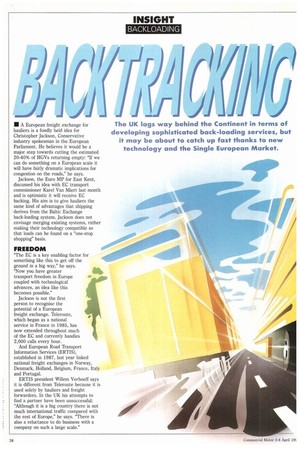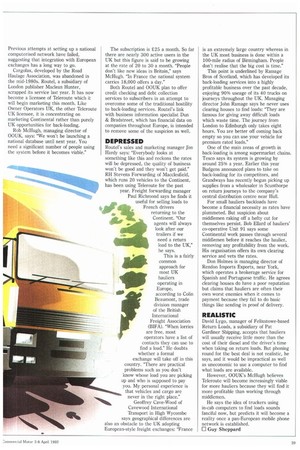• A European freight exchange for hauliers is a fondly
Page 40

Page 41

If you've noticed an error in this article please click here to report it so we can fix it.
held idea for Christopher Jackson, Conservative industry spokesman in the European Parliament. He believes it would be a major step towards cutting the estimated 20-40% of HGVs returning empty: "If we can do something on a European scale it will have fairly dramatic implications for congestion on the roads," he says.
Jackson, the Euro MP for East Kent, discussed his idea with EC transport commissioner Karel Van Miert last month and is optimistic it will receive EC backing. His aim is to give hauliers the same kind of advantages that shipping derives from the Baltic Exchange back-loading system. Jackson does not envisage merging existing systems, rather making their technology compatible so that loads can be found on a "one-stop shopping" basis.
"The EC is a key enabling factor for something like this to get off the ground in a big way," he says. "Now you have greater transport freedom in Europe coupled with technological advances, an idea like this becomes possible."
Jackson is not the first person to recognise the potential of a European freight exchange. Teleroute, which began as a national service in France in 1985, has now extended throughout much of the EC and currently handles 2,000 calls every hour.
And European Road Transport Information Services (ERTIS), established in 1987, last year linked national freight exchanges in Norway, Denmark, Holland, Belgium, France, Italy and Portugal.
ERTIS president Willem Verhoeff says it is different from Teleroute because it is used solely by hauliers and freight forwarders. In the UK his attempts to find a partner have been unsuccessful: "Although it is a big country there is not much international traffic compared with the rest of Europe," he says. "There is also a reluctance to do business with a company on such a large scale." Previous attempts at setting up a national computerised network have failed, suggesting that integration with European exchanges has a long way to go.
Cargofax, developed by the Road Haulage Association, was abandoned in the mid-1980s. Routel, a subsidiary of London publisher Maclean Hunter, scrapped its service last year. It has now become a licensee of Teleroute which it will begin marketing this month. Like Owner Operators UK, the other Teleroute UK licensee, it is concentrating on marketing Continental rather than purely UK opportunities for back-loading.
Rob McHugh, managing director of 00UK, says: "We won't be launching a national database until next year. You need a significant number of people using the system before it becomes viable." The subscription is £25 a month. So far there are nearly 300 active users in the UK but this figure is said to be growing at the rate of 20 to 30 a month. "People don't like new ideas in Britain," says McHugh. "In France the national system carries 18,000 offers a day."
Both Routel and 00UK plan to offer credit checking and debt collection services to subscribers in an attempt to overcome some of the traditional hostility to back-loading services. Routers link with business information specialist Dun & Bradstreet, which has financial data on companies throughout Europe, is intended to remove some of the suspicion as well.
Routel's sales and marketing manager Jim Hardy says: "Everybody looks at something like this and reckons the rates will be depressed, the quality of business won't be good and they won't get paid." RH Stevens Forwarding of Macclesfield, which runs 20 vehicles to the Continent, has been using Teleroute for the past year. Freight forwarding manager Paul Richmond says he finds it useful for selling loads to French drivers returning to the Continent. "Our agents will always look after our trailers if we need a return load to the UK," he says.
This is a fairly approach for most UK hauliers operating in Europe, according to Cohn Beaumont, trade division manager of the British International Freight Association (BIFA). When lorries are free, most operators have a list of contacts they can use to find a load." He doubts whether a formal exchange will take off in this country. 'There are practical problems such as you don't know whose load you are picking up and who is supposed to pay you. My personal experience is that vehicles and cargo are never in the right place." Geoffrey Cave-Wood of Cavewood International Transport in High Wycombe says geographical differences are also an obstacle to the UK adopting European-style freight exchanges: "France is an extremely large country whereas in the UK most business is done within a 100-mile radius of Birmingham, People don't realise that the big cost is time,' This point is underlined by Ramage Bros of Scotland, which has developed its back-loading services into a highly profitable business over the past decade, enjoying 90% useage of its 40 trucks on journeys throughout the UK. Managing director John Ramage says he never uses clearing houses to find loads: "They are famous for giving away difficult loads which waste time. The journey from London to Edinburgh only takes eight hours. You are better off coming back empty so you can use your vehicle for premium rated loads."
One of the main areas of growth in back-loading is among supermarket chains. Tesco says its system is growing by around 25% a year. Earlier this year Budgens announced plans to take on back-loading for its competitors, and Grandways has recently begun picking up supplies from a wholesaler in Scunthorpe on return journeys to the company's central distribution centre near Hull.
For small hauliers backloads have become a financial necessity as rates have plummeted. But suspicion about middlemen raking off a hefty cut for themselves persist. Bob Ellard of hauliers' co-operative Unit 91 says some Continental work passes through several middlemen before it reaches the haulier, removing any profitability from the work. His organisation offers its own clearing service and vets the rates.
Don Holmes is managing director of Rendon Imports Exports, near York, which operates a brokerage service for Spanish and Portuguese traffic. He agrees clearing houses do have a poor reputation but claims that hauliers are often their own worst enemies when it comes to payment because they fail to do basic things like sending in proof of delivery.
David Lygo, manager of Felixstowe-based Return Loads, a subsidiary of Pat Gardiner Shipping, accepts that hauliers will usually receive little more than the cost of their diesel and the driver's time when taking on return loads. But phoning round for the best deal is not realistic, he says, and it would be impractical as well as uneconomic to use a computer to find what loads are available.
However, 00UK's McHugh believes Teleroute will become increasingly viable for more hauliers because they will find it more profitable than working through middlemen.
He says the idea of truckers using in-cab computers to find loads sounds fanciful now, but predicts it will become a reality once a pan-European mobile phone network is established.
Guy Sheppard
















































































































